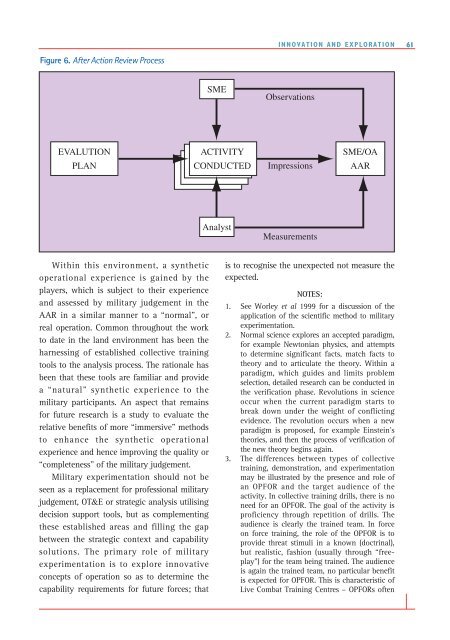ISSUE 152 : Jan/Feb - 2002 - Australian Defence Force Journal
ISSUE 152 : Jan/Feb - 2002 - Australian Defence Force Journal
ISSUE 152 : Jan/Feb - 2002 - Australian Defence Force Journal
- No tags were found...
Create successful ePaper yourself
Turn your PDF publications into a flip-book with our unique Google optimized e-Paper software.
INNOVATION AND EXPLORATION 61Figure 6. After Action Review ProcessSMEObservationsEVALUTIONACTIVITYSME/OAPLANCONDUCTEDImpressionsAARAnalystMeasurementsWithin this environment, a syntheticoperational experience is gained by theplayers, which is subject to their experienceand assessed by military judgement in theAAR in a similar manner to a “normal”, orreal operation. Common throughout the workto date in the land environment has been theharnessing of established collective trainingtools to the analysis process. The rationale hasbeen that these tools are familiar and providea “natural” synthetic experience to themilitary participants. An aspect that remainsfor future research is a study to evaluate therelative benefits of more “immersive” methodsto enhance the synthetic operationalexperience and hence improving the quality or“completeness” of the military judgement.Military experimentation should not beseen as a replacement for professional militaryjudgement, OT&E or strategic analysis utilisingdecision support tools, but as complementingthese established areas and filling the gapbetween the strategic context and capabilitysolutions. The primary role of militaryexperimentation is to explore innovativeconcepts of operation so as to determine thecapability requirements for future forces; thatis to recognise the unexpected not measure theexpected.NOTES:1. See Worley et al 1999 for a discussion of theapplication of the scientific method to militaryexperimentation.2. Normal science explores an accepted paradigm,for example Newtonian physics, and attemptsto determine significant facts, match facts totheory and to articulate the theory. Within aparadigm, which guides and limits problemselection, detailed research can be conducted inthe verification phase. Revolutions in scienceoccur when the current paradigm starts tobreak down under the weight of conflictingevidence. The revolution occurs when a newparadigm is proposed, for example Einstein’stheories, and then the process of verification ofthe new theory begins again.3. The differences between types of collectivetraining, demonstration, and experimentationmay be illustrated by the presence and role ofan OPFOR and the target audience of theactivity. In collective training drills, there is noneed for an OPFOR. The goal of the activity isproficiency through repetition of drills. Theaudience is clearly the trained team. In forceon force training, the role of the OPFOR is toprovide threat stimuli in a known (doctrinal),but realistic, fashion (usually through “freeplay”)for the team being trained. The audienceis again the trained team, no particular benefitis expected for OPFOR. This is characteristic ofLive Combat Training Centres – OPFORs often
















